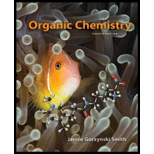
Organic Chemistry
4th Edition
ISBN: 9780073402772
Author: Janice G. Smith
Publisher: MCG
expand_more
expand_more
format_list_bulleted
Concept explainers
Question
Chapter 31, Problem 31.13P
Interpretation Introduction
Interpretation: The
Concept introduction: The
Expert Solution & Answer
Want to see the full answer?
Check out a sample textbook solution
Students have asked these similar questions
Don't use ai to answer I will report you answer
Consider a solution of 0.00304 moles of 4-nitrobenzoic acid (pKa = 3.442) dissolved in 25 mL water and titrated with 0.0991 M NaOH. Calculate the pH at the equivalence point
What is the name of the following compound?
SiMe3
Chapter 31 Solutions
Organic Chemistry
Ch. 31 - Prob. 31.1PCh. 31 - Prob. 31.2PCh. 31 - Prob. 31.3PCh. 31 - Draw the mechanism for the radical polymerization...Ch. 31 - Prob. 31.5PCh. 31 - Prob. 31.6PCh. 31 - Prob. 31.7PCh. 31 - Prob. 31.8PCh. 31 - Prob. 31.9PCh. 31 - Prob. 31.10P
Ch. 31 - Prob. 31.11PCh. 31 - Problem 30.12
What polymer is formed by anionic...Ch. 31 - Prob. 31.13PCh. 31 - Prob. 31.14PCh. 31 - Problem 30.15
What polyamide is formed from each...Ch. 31 - Prob. 31.16PCh. 31 - Prob. 31.17PCh. 31 - Prob. 31.18PCh. 31 - Prob. 31.19PCh. 31 - Prob. 31.20PCh. 31 - Prob. 31.21PCh. 31 - Prob. 31.22PCh. 31 - Prob. 31.23PCh. 31 - Prob. 31.24PCh. 31 - Prob. 31.25PCh. 31 - Prob. 31.26PCh. 31 - 30.26 Draw the structure of the polymer formed by...Ch. 31 - Prob. 31.28PCh. 31 - Prob. 31.29PCh. 31 - Prob. 31.30PCh. 31 - Prob. 31.31PCh. 31 - Prob. 31.32PCh. 31 - Prob. 31.33PCh. 31 - Prob. 31.34PCh. 31 - Prob. 31.35PCh. 31 - Prob. 31.36PCh. 31 - Prob. 31.37PCh. 31 - Prob. 31.38PCh. 31 - Prob. 31.39PCh. 31 - 30.39 Draw a stepwise mechanism for the...Ch. 31 - 30.40 Cationic polymerization of 3-phenylpropene ...Ch. 31 - Prob. 31.42PCh. 31 - Prob. 31.43PCh. 31 - 30.43 Although styrene undergoes both cationic and...Ch. 31 - 30.44 Rank the following compounds in order of...Ch. 31 - Prob. 31.46PCh. 31 - Prob. 31.47PCh. 31 - 30.47 Draw a stepwise mechanism for the following...Ch. 31 - 30.48 Draw a stepwise mechanism for the reaction...Ch. 31 - Prob. 31.50PCh. 31 - Prob. 31.51PCh. 31 - Prob. 31.52PCh. 31 - 30.52 (a) Explain why poly (vinyl alcohol) cannot...Ch. 31 - Prob. 31.54PCh. 31 - 30.53 Devise a synthesis of terephthalic acid and...Ch. 31 - Prob. 31.56PCh. 31 - Prob. 31.57PCh. 31 - 30.56 Compound A is a novel poly (ester amide)...Ch. 31 - Researchers at Rutgers University have developed...Ch. 31 - 30.58 Melmac, a thermosetting polymer formed from...Ch. 31 - 30.59 Although chain branching in radical...Ch. 31 - Prob. 31.62P
Knowledge Booster
Learn more about
Need a deep-dive on the concept behind this application? Look no further. Learn more about this topic, chemistry and related others by exploring similar questions and additional content below.Similar questions
- K Draw the starting structure that would lead to the major product shown under the provided conditions. Drawing 1. NaNH2 2. PhCH2Br 4 57°F Sunny Q Searcharrow_forward7 Draw the starting alkyl bromide that would produce this alkyne under these conditions. F Drawing 1. NaNH2, A 2. H3O+ £ 4 Temps to rise Tomorrow Q Search H2arrow_forward7 Comment on the general features of the predicted (extremely simplified) ¹H- NMR spectrum of lycopene that is provided below. 00 6 57 PPM 3 2 1 0arrow_forward
arrow_back_ios
SEE MORE QUESTIONS
arrow_forward_ios
Recommended textbooks for you
 Organic Chemistry: A Guided InquiryChemistryISBN:9780618974122Author:Andrei StraumanisPublisher:Cengage Learning
Organic Chemistry: A Guided InquiryChemistryISBN:9780618974122Author:Andrei StraumanisPublisher:Cengage Learning

Organic Chemistry: A Guided Inquiry
Chemistry
ISBN:9780618974122
Author:Andrei Straumanis
Publisher:Cengage Learning